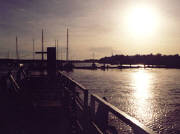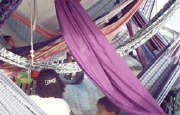As soon as term finished, and the last of the papers were graded, I packed my rucksack and hit the road. I was the perfect traveller, I had no definite plan and no definite literary. I crammed three weeks of clothes, sleeping bag, cameras, maps, mosquito nets and my hammock into my smallest travelling pack and left. It was as simple as that. It always is.
By the time I arrived in Belem 26 hours later, tired, hot and relieved to be away from the office I had formulated a rough plan. I would travel north by bus, boat or foot not stopping until I ran out of road. The simplicity of the plan appealed to me and I set off in search of a boat.
The captain of the boat I eventually found, after a hot sticky afternoon trekking ’round the grimy docks of downtown Belem, looked at me with a mixture of suspicion and surprise. He was a big solid man who, unlike his ancient boat which sat mournfully rotting in the low tide, looked like he could deal with anything life cared to throw at him. He wasn’t sure when he would be ready to leave, but yes he was going north and was prepared to take some passengers. But why didn’t I want to fly?

As he left shaking his head and pocketing the $20 we had agreed on for my passage upriver he jerked his thumb towards the deserted deck and told me I could sleep on deck that night instead of paying for a hotel. Later as the sun sank, the crew sprawled on the creaking wooden dock playing cards by candlelight and drinking rum. As the stars began to come out the crew drifted off and left me alone – totally alone. I climbed onto the top deck, slung my hammock and listened to the lapping of the water against the hull.
The next morning as the sun began to rise the stevedores arrived to load the boat. With taut rippling muscles honed from years of back breaking work, they smiled at me as if it was perfectly normal to find a lone Englishman asleep on the top deck of a perfectly deserted boat on the edge of the mighty Amazon river. I laid in my hammock letting the early morning sun warm my stiff joints and bones, enjoying the pure luxury of watching other people work.
By the time I had mustered sufficient energy to go in search of breakfast, the quay was piled high with every possible commodity you could imagine. The basics of daily life, such as toothpaste, flour and several carcasses of beef were stacked precariously alongside spare parts for a tractor, several engine blocks, six remoulded tractor tyres, four outboard motors, case after case after case of beer, boxes of contraceptives and a whole load of things which I am sure wasn’t really what I thought it was.
I walked off aimlessly towards the town in search of some food. The first shack I came to outside of the boatyard was run by a wizened toothless old man of indeterminable age, whose skin was so burnt by the sun that he looked vaguely like a peach stone that has been left in the sun to dry. I warmed to him instantly.
He poured me a chilled caja juice into a cracked dirty cup and invited me into the shade of his living room-cum-bedroom-cum kitchen. His few possessions lay scattered on the floor and a wide eyed child laid feverishly in the hammock which was strung from the rafters. “I am happy,” he said as way of explanation to my unasked question, “what more can a man aspire to than a view of the river, a roof over his head and the respect of the community?”

The boat, the Bom Jesus (as in Jesus – will that really float?) was still being loaded 12 hours later and the stevedores seemed to be on their last legs as they staggered up and down the quay with increasingly heavy and cumbersome loads. A few more passengers had drifted onto the boat with their possessions tied in their colourful hammocks and began to make themselves comfortable. I sat on the rail writing my diary, a few of the passengers cast me doubtful looks clearly not accustomed to seeing a lone, and very scruffy Englishman sitting half naked in the late afternoon sun scribbling away.
The quay was now alive with passengers, shipping officials rushing around with grubby manifests talking ten to the dozen, stevedores throwing more boxes of crackers into the hold and peddlers selling everything from savoury pastries to toothpaste. Typically the one salesman I wanted to come by, the beer man, was nowhere to be seen and I was forced to slake my thirst with a bottle of warm mineral water. I thought: Theroux never has these problems.
Read all four parts of The Secret Policeman’s Whorehouse
Part 1
Part 2
Part 3
Part 4